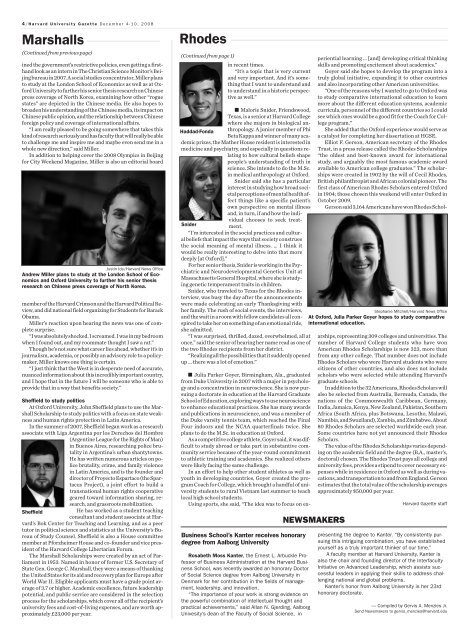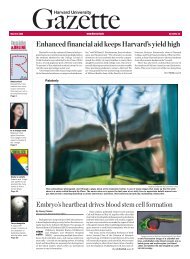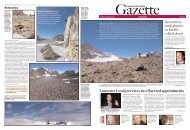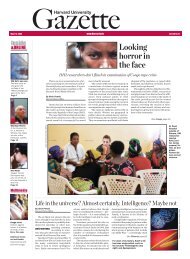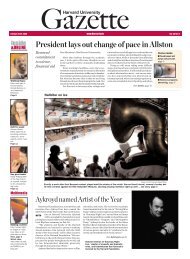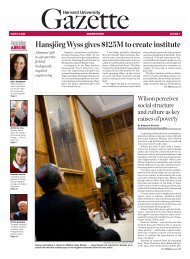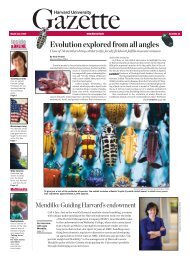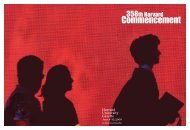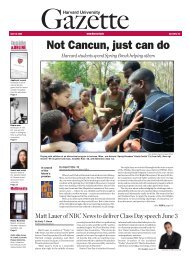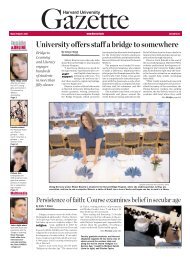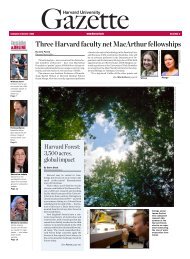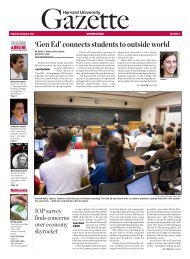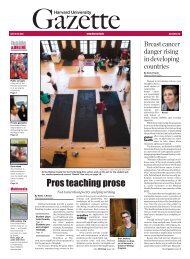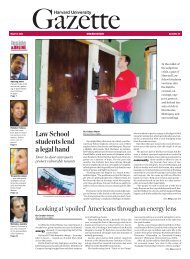Harvard University Gazette December 4-10, 2008 - Harvard News ...
Harvard University Gazette December 4-10, 2008 - Harvard News ...
Harvard University Gazette December 4-10, 2008 - Harvard News ...
You also want an ePaper? Increase the reach of your titles
YUMPU automatically turns print PDFs into web optimized ePapers that Google loves.
4 / <strong>Harvard</strong> <strong>University</strong> <strong>Gazette</strong> <strong>December</strong> 4-<strong>10</strong>, <strong>2008</strong><br />
Marshalls<br />
(Continued from previous page)<br />
ined the government’s restrictive policies, even getting a firsthand<br />
look as an intern in The Christian Science Monitor’s Beijing<br />
bureau in 2007. A social studies concentrator, Miller plans<br />
to study at the London School of Economics as well as at Oxford<br />
<strong>University</strong> to further his senior thesis research on Chinese<br />
press coverage of North Korea, examining how other “rogue<br />
states” are depicted in the Chinese media. He also hopes to<br />
broaden his understanding of the Chinese media, its impact on<br />
Chinese public opinion, and the relationship between Chinese<br />
foreign policy and coverage of international affairs.<br />
“I am really pleased to be going somewhere that takes this<br />
kind of research seriously and has faculty that will really be able<br />
to challenge me and inspire me and maybe even send me in a<br />
whole new direction,” said Miller.<br />
In addition to helping cover the <strong>2008</strong> Olympics in Beijing<br />
for City Weekend Magazine, Miller is also an editorial board<br />
Justin Ide/<strong>Harvard</strong> <strong>News</strong> Office<br />
Andrew Miller plans to study at the London School of Economics<br />
and Oxford <strong>University</strong> to further his senior thesis<br />
research on Chinese press coverage of North Korea.<br />
member of the <strong>Harvard</strong> Crimson and the <strong>Harvard</strong> Political Review,<br />
and did national field organizing for Students for Barack<br />
Obama.<br />
Miller’s reaction upon hearing the news was one of complete<br />
surprise.<br />
“I was absolutely shocked. I screamed. I was in my bedroom<br />
when I found out, and my roommate thought I saw a rat.”<br />
Though he’s not sure what career lies ahead, whether it’s in<br />
journalism, academia, or possibly an advisory role to a policymaker,<br />
Miller knows one thing is certain.<br />
“I just think that the West is in desperate need of accurate,<br />
nuanced information about this incredibly important country,<br />
and I hope that in the future I will be someone who is able to<br />
provide that in a way that benefits society.”<br />
Sheffield to study politics<br />
At Oxford <strong>University</strong>, John Sheffield plans to use the Marshall<br />
Scholarship to study politics with a focus on state weakness<br />
and human rights protection in Latin America.<br />
In the summer of 2007, Sheffield began work as a research<br />
associate with Liga Argentina por los Derechos del Hombre<br />
(Argentine League for the Rights of Man)<br />
in Buenos Aires, researching police brutality<br />
in Argentina’s urban shantytowns.<br />
He has written numerous articles on police<br />
brutality, crime, and family violence<br />
in Latin America, and is the founder and<br />
director of Proyecto Espartaco (the Spartacus<br />
Project), a joint effort to build a<br />
transnational human rights cooperative<br />
geared toward information sharing, research,<br />
and grassroots mobilization.<br />
Sheffield<br />
He has worked as a student teaching<br />
consultant and student associate at <strong>Harvard</strong>’s<br />
Bok Center for Teaching and Learning, and as a peer<br />
tutor in political science and statistics at the <strong>University</strong>’s Bureau<br />
of Study Counsel. Sheffield is also a House committee<br />
member at Pforzheimer House and co-founder and vice president<br />
of the <strong>Harvard</strong> College Libertarian Forum.<br />
The Marshall Scholarships were created by an act of Parliament<br />
in 1953. Named in honor of former U.S. Secretary of<br />
State Gen. George C. Marshall, they were a means of thanking<br />
the United States for its aid and recovery plan for Europe after<br />
World War II. Eligible applicants must have a grade point average<br />
of 3.7 or higher. Academic excellence, future leadership<br />
potential, and public service are considered in the selection<br />
process for the scholarships, which cover all of the recipient’s<br />
university fees and cost-of-living expenses, and are worth approximately<br />
£23,000 per year.<br />
Rhodes<br />
(Continued from page 1)<br />
Haddad-Fonda<br />
in recent times.<br />
“It’s a topic that is very current<br />
and very important. And it’s something<br />
that I want to understand and<br />
to understand in a historic perspective<br />
as well.”<br />
Snider<br />
■ Malorie Snider, Friendswood,<br />
Texas, is a senior at <strong>Harvard</strong> College<br />
where she majors in biological anthropology.<br />
A junior member of Phi<br />
Beta Kappa and winner of many academic<br />
prizes, the Mather House resident is interested in<br />
medicine and psychiatry, and especially in questions relating<br />
to how cultural beliefs shape<br />
people’s understanding of truth in<br />
science. She intends to do the M.Sc.<br />
in medical anthropology at Oxford.<br />
Snider said she has a particular<br />
interest in studying how broad societal<br />
perceptions of mental health affect<br />
things like a specific patient’s<br />
own perspective on mental illness<br />
and, in turn, if and how the individual<br />
chooses to seek treatment.<br />
“I’m interested in the social practices and cultural<br />
beliefs that impact the ways that society construes<br />
the social meaning of mental illness. … I think it<br />
would be really interesting to delve into that more<br />
deeply [at Oxford].”<br />
For her senior thesis, Snider is working in the Psychiatric<br />
and Neurodevelopmental Genetics Unit at<br />
Massachusetts General Hospital, where she is studying<br />
genetic temperament traits in children.<br />
Snider, who traveled to Texas for the Rhodes interview,<br />
was busy the day after the announcements<br />
were made celebrating an early Thanksgiving with<br />
her family. The rush of social events, the interviews,<br />
and the wait in a room with fellow candidates all conspired<br />
to take her on something of an emotional ride,<br />
she admitted.<br />
“I was surprised, thrilled, dazed, overwhelmed, all at<br />
once,” said the senior of hearing her name read as one of<br />
the two Rhodes recipients from her district.<br />
“Realizing all the possibilities that it suddenly opened<br />
up … there was a lot of emotion.”<br />
Business School’s Kanter receives honorary<br />
degree from Aalborg <strong>University</strong><br />
Rosabeth Moss Kanter, the Ernest L. Arbuckle Professor<br />
of Business Administration at the <strong>Harvard</strong> Business<br />
School, was recently awarded an honorary Doctor<br />
of Social Science degree from Aalborg <strong>University</strong> in<br />
Denmark for her contribution in the fields of management,<br />
leadership, and innovation.<br />
“The importance of your work is strong evidence on<br />
the powerful combination of intellectual thought and<br />
practical achievements,” said Allan N. Gjerding, Aalborg<br />
Univesity’s dean of the Faculty of Social Science, in<br />
Stephanie Mitchell/<strong>Harvard</strong> <strong>News</strong> Office<br />
At Oxford, Julia Parker Goyer hopes to study comparative<br />
international education.<br />
NEWSMAKERS<br />
■ Julia Parker Goyer, Birmingham, Ala., graduated<br />
from Duke <strong>University</strong> in 2007 with a major in psychology<br />
and a concentration in neuroscience. She is now pursuing<br />
a doctorate in education at the <strong>Harvard</strong> Graduate<br />
School of Education, exploring ways to use neuroscience<br />
to enhance educational practices. She has many awards<br />
and publications in neuroscience, and was a member of<br />
the Duke varsity tennis team, which reached the Final<br />
Four indoors and the NCAA quarterfinals twice. She<br />
plans to do the M.Sc. in education at Oxford.<br />
As a competitive college athlete, Goyer said, it was difficult<br />
to study abroad or take part in substantive community<br />
service because of the year-round commitment<br />
to athletic training and academics. She realized others<br />
were likely facing the same challenge.<br />
In an effort to help other student athletes as well as<br />
youth in developing countries, Goyer created the program<br />
Coach for College, which brought a handful of university<br />
students to rural Vietnam last summer to teach<br />
local high school students.<br />
Using sports, she said, “The idea was to focus on experiential<br />
learning … [and] developing critical thinking<br />
skills and promoting excitement about academics.”<br />
Goyer said she hopes to develop the program into a<br />
truly global initiative, expanding it to other countries<br />
and also incorporating other American universities.<br />
“One of the reasons why I wanted to go to Oxford was<br />
to study comparative international education to learn<br />
more about the different education systems, academic<br />
curricula, personnel of the different countries so I could<br />
see which ones would be a good fit for the Coach for College<br />
program.”<br />
She added that the Oxford experience would serve as<br />
a catalyst for completing her dissertation at HGSE.<br />
Elliot F. Gerson, American secretary of the Rhodes<br />
Trust, in a press release called the Rhodes Scholarships<br />
“the oldest and best-known award for international<br />
study, and arguably the most famous academic award<br />
available to American college graduates.” The scholarships<br />
were created in 1902 by the will of Cecil Rhodes,<br />
British philanthropist and African colonial pioneer. The<br />
first class of American Rhodes Scholars entered Oxford<br />
in 1904; those chosen this weekend will enter Oxford in<br />
October 2009.<br />
Gerson said 3,164 Americans have won Rhodes Scholarships,<br />
representing 309 colleges and universities. The<br />
number of <strong>Harvard</strong> College students who have won<br />
American Rhodes Scholarships is now 323, more than<br />
from any other college. That number does not include<br />
Rhodes Scholars who were <strong>Harvard</strong> students who were<br />
citizens of other countries, and also does not include<br />
scholars who were selected while attending <strong>Harvard</strong>’s<br />
graduate schools.<br />
In addition to the 32 Americans, Rhodes Scholars will<br />
also be selected from Australia, Bermuda, Canada, the<br />
nations of the Commonwealth Caribbean, Germany,<br />
India, Jamaica, Kenya, New Zealand, Pakistan, Southern<br />
Africa (South Africa, plus Botswana, Lesotho, Malawi,<br />
Namibia, and Swaziland), Zambia, and Zimbabwe. About<br />
80 Rhodes Scholars are selected worldwide each year.<br />
Some countries have not yet announced their Rhodes<br />
Scholars.<br />
The value of the Rhodes Scholarships varies depending<br />
on the academic field and the degree (B.A., master’s,<br />
doctoral) chosen. The Rhodes Trust pays all college and<br />
university fees, provides a stipend to cover necessary expenses<br />
while in residence in Oxford as well as during vacations,<br />
and transportation to and from England. Gerson<br />
estimates that the total value of the scholarship averages<br />
approximately $50,000 per year.<br />
<strong>Harvard</strong> <strong>Gazette</strong> staff<br />
presenting the degree to Kanter. “By consistently pursuing<br />
this intriguing combination, you have established<br />
yourself as a truly important thinker of our time.”<br />
A faculty member at <strong>Harvard</strong> <strong>University</strong>, Kanter is<br />
also the chair and founding director of the Interfaculty<br />
Initiative on Advanced Leadership, which assists successful<br />
leaders in applying their skills to address challenging<br />
national and global problems.<br />
Kanter’s honor from Aalborg <strong>University</strong> is her 23rd<br />
honorary doctorate.<br />
— Compiled by Gervis A. Menzies Jr.<br />
Send <strong>News</strong>makers to gervis_menzies@harvard.edu


